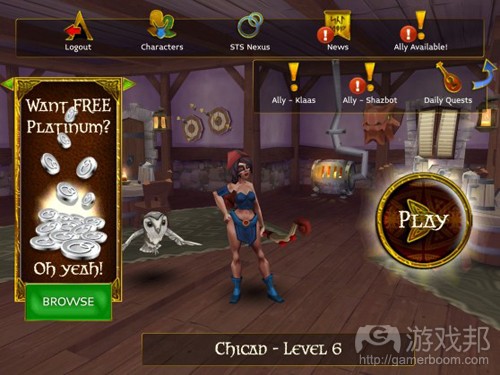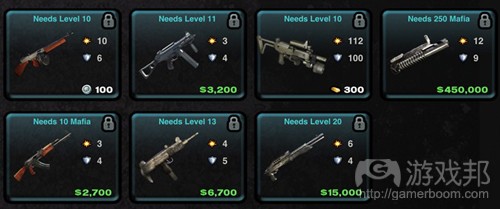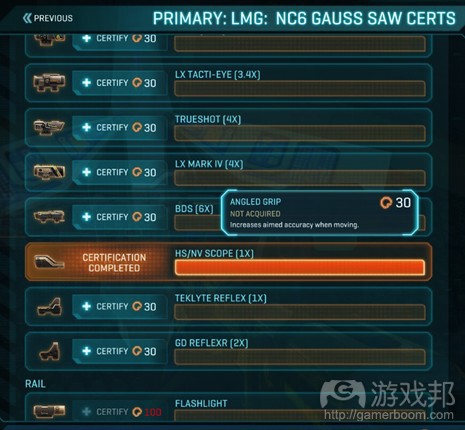免费增值游戏应回避的5个错误做法
作者:Benjamin Sipe
免费游戏或免费商业模式仍然是新鲜的。在早期,免费游戏开发者通常采用各种花招诡计从玩家身上榨取收益,有些甚至发明了我们称之为“花钱买赢”的游戏玩法,也就是玩家只要肯花钱,基本上就能保证获胜。这些做法保障了开发者的赢利,但随着市场竞争加剧、商业模式成熟、玩家期待提高,玩家会越来越不能接受这种做法。免费游戏带来的弊端不会彻底消失,但开发者们最好能够先知先觉,现在就开始设计和制作更聪明的游戏。以下是5个普遍的错误:
1、让玩家给好友滥发邮件
我知道Facebook游戏中非常流行滥发好友邀请邮件,而且根据玩家在游戏中的“好友”数量限制可玩的内容。像“交友”或“应用内购买”(IAP)应该作为游戏体验的补充,而不是必要组成。不要因为我的好友人数不足就不让我玩某些内容。我认为开发者明白“好友限定内容”最终会退出手机游戏;然而,新游戏仍然没有放弃那么做。
2、引诱玩家付钱和分享
衰退或废止机制被广泛运用于免费游戏中。取决于游戏主题,衰退和废止可以自然地融入游戏中,但玩家开始不喜欢废止机制,特别是当它与你可以与之产生情感联系的东西如宠物有关时。在《Hay Day》中,如果因为你不能上线喂养宠物,它就会死掉,那么这款游戏还会这么火暴吗?
另一个机制其实就是一种欺骗性的商业手段,即让某些按钮很难找到或使用。我曾见过游戏把“X”按钮隐藏起来,这样玩家就会以为自己必须购买某物;或者灰掉按钮,这样玩家就以为自己必须“分享”到Facebook才能进入下一个场景。这些做法是高明还是误导?没有正确的答案,但如果与钱无关,也许会更好。开发者必须问自己,他们是想通过这些诡计增加收益还是靠游戏本身的品质来刺激玩家分享和消费。我认为,开发者应该站在道德和对玩家公平的立场上做选择。
3、糟糕的广告
不要再使用烦人的广告方式了。我指的正是横幅广告!通常开发商纠结是否使用广告时,是担忧广告会拖累IAP收益。确实,但只有广告做得不好时。
不想花钱的玩家总会以另一种方式回馈开发者。想花钱的玩家会继续花钱,因为他们并不关心广告。然而,如果你用广告干扰他们的视线或混乱了UI,那么你就会把所有玩家赶跑。这就是为什么我并不赞成“花钱取消广告”。你这是把垃圾倒在玩家面前,并且对他们承认自己的做法。你本不必这样。
4、操纵免费玩家vs.玩家(PvP)游戏
如果你还认为“所有免费PvP游戏都是花钱买赢”,那么在这里我告诉你,你错了。有花钱买赢的,那么也有花钱只能买竞争优势的。以下面这张图为例:
刷游戏币买来的武器的攻击值是3-12,防御值是4-9,而对于真钱购买的武器,攻击值是112,防御值是100.这款游戏是纯粹看数值,所以显然,如果你购买了这种武器,那就没有人是你的对手了。不花钱的玩家拿什么对抗这种花钱的玩家?那就是花钱。
现在,我们再看看另一款叫作《行星边际2》的免费PvP游戏。在一款第一人称射击PC游戏中,你可以用真钱购买不同的武器和升级交通工具,或者你也可以刷游戏来解锁它们,只是要费一些时间。
有些武器威力大、有些装弹速度快,有些命中率高,还有些具有交通工具追踪能力。然而,单靠伤害输出高并不能让你直接赢得战斗。还要考虑发弹速度、装弹速度等各种属性,因为这些属性只是弥补你玩这款游戏的本能不足。这还没完。
每一种枪、职业和武器都有特定的升级——如减少反冲、增加玩家命值上限、提高职业技能和增加视野或夜视能力等。这些职业或武器升级只能通过中介货币(游戏点数)购买,但这些点数是不能购买的。你可以花钱提高获得点数的速度,但仍然很费时间。为什么一定要这么做?玩家可以花钱买适合自己的操作风格的武器,但他们无法立即用增益道具来强化他们的武器或角色。无论你是否喜欢这款游戏,你也不能否认,这种免费PvP体验确实很强悍。
5、强迫玩家花钱继续玩
我最近在我的平板上下载了一款新游戏。正当我玩得高兴时,精力和金钱耗光了(提醒你一定要按游戏教程玩)。我有三个任务除非我花钱,否则无法完成。延迟机制、堵塞点、阻力——无论你怎么称呼这种情况,这是免费游戏的惯用赢利策略。在此,我并没有让你不要使用这种手段。我想说的是,卓越的游戏不会把玩家逼走,而是等他们自己离开。
以《Clash of Clans》为例。为了把我的城镇大厅从2级升到6级,我要玩游戏30天。我可以花5美元提高建设速度,这样就只需要20天,或者我可以直接砸100美元(或500美元)立即得到。这款游戏使用了相同的延迟机制,但游戏不只是建设城市和巩固防御工事。那只是战斗的一部分。另一部分是袭击其他村庄。真正的战斗部分持续数分钟,训练基本军事单位通常不超过20分钟。更先进的单位需要的训练时间往往也更多,但你袭击其他村庄几乎都不超过20分钟。这个二级机制或二级核心循环让玩家在等待单位升级完成时有事可做。
显然,这些机制是你的游戏的主要的收益/营销机制。我不是说如果你再使用这些机制就挣不了钱。我只是想说,随着市场成熟,游戏设计也会更成熟,和玩家期待也会提高。今天的你就应该开始考虑更明智的选择,否则明天的你将为游戏能不能挣到最后一分钱而焦虑。(本文为游戏邦/gamerboom.com编译,拒绝任何不保留版权的转载,如需转载请联系:游戏邦)
5 ways developers fail at freemium games
by Benjamin Sipe
The freemium or free-to-play (F2P) business model is still new. Some early adopters have used exploits or tricks to squeeze money from their players while others created what we call a “pay-to-win” experience that practically guarantees victory if you pay money. These tactics may have generated a lot of revenue for developers, but as the market, business model, and expectations mature, players will accept them less and less. They probably won’t go away altogether, but it’s better to get ahead of the curve and start designing and executing smarter games today. Here are 5 examples of what not to do.
Make players spam their friends
I know this was a popular tactic in Facebook games, but stop gating content based on the number of “friends” someone has in the game. Actions like “friending” or “making an in-app purchase” (IAP) should complement the experience, not be a requisite. Don’t hold content back from me until I’ve recruited enough friends. My assumption was that developers understood that friend-gating content would ultimately fail on mobile; however, I’m still seeing this in new releases.
Trick people into paying and sharing
Decay or extinction mechanics are widely used in freemium gaming. Decay and delay can be natural fits depending on the theme, but players have started to dislike the extinction mechanic, and it’s becoming less popular — especially if it involves something you can create a bond with, like a pet. How popular would Hay Day be if your animals died because you didn’t log in to feed them?
Another mechanic that’s potentially a deceptive business practice is making some buttons difficult to find or press. I’ve seen games try to hide Xs so people thought they had to purchase something or grey out buttons so they believed they had to “share” on Facebook to get to the next screen. Are these tactics clever or just misleading? There’s no right answer, but it’s probably better if it doesn’t involve money. Developers have to ask themselves whether they want to increase monetization through tricks or by making an awesome game that people naturally want to share or pay money for. Personally, I would think about what seems ethical and fair to your players.
Advertise poorly
Stop using intrusive, sloppy advertising solutions. I’m looking at you, banner ads! The first argument a developer usually makes is that adding advertisement solutions will cannibalize its IAP revenue. That’s true, but only if you don’t advertise intelligently. W3i conducted a study and blogged about it. Take the screenshot at the top as an example of how to advertise well.
People who don’t intend to pay have another way of giving back to the developer. Players who want to pay will continue to since they don’t care about advertisements, anyway. However, if you obstruct their view or clutter the user interface, then you could drive all players away. That’s why I’m not a fan of the “paying to remove ads” feature. You’re spamming your players and admitting it to them. It doesn’t have to be like this.
Design rigged F2P player vs. player (PvP) games
If you’re thinking, “But all F2P PvP games are pay-to-win,” I’m here to tell you that you’re wrong. There’s paying to win, and then there’s paying for competitive advantage. Take a look at this screenshot, for example.
Attacks range from 3-12 and defenses 4-9 for grinding currency weapons, but for a premium weapon … well, you only get 112 attack and 100 defense. This game is purely stat driven, so buying this weapon clearly allows you to beat everyone else, and there’s nothing a non-paying player can do to win against these players unless they pay, too.
Now let’s look at another F2P PvP game called PlanetSide 2. It’s a first-person shooter (for PC) where you can buy different weapons and vehicle upgrades with premium currency (station cash) — or you can grind to unlock them, but it’ll take some time.
Some are more powerful, have faster/slower reload speeds, and are more accurate or have lock-on capabilities for vehicles. However, just having a higher damage output doesn’t mean you’ll automatically win a battle. It’s the same with fire rate, reload speed, or any other characteristic because these stats only complement your natural ability to play the game. But wait … there’s more.
Each gun, class, and weapon has specific upgrades that can do a magnitude of things — like reduce recoil, grant more player health, improve class abilities, and add scopes or night vision. These class or weapon upgrades can only be purchased through the secondary currency (cert points), but these points cannot be purchased. You can pay to speed up the rate of earning them, but it’ll still take some time. Why is this important? Players can pay to get the guns that match their play style, but they can’t immediately deck out their weapons or characters with enhancements. Whether you like the game or not, it’s hard to deny that they executed a really solid F2P PvP experience.
Force players to pay to continue
I recently downloaded a new game on my tablet and was enjoying the experience until I ran out of energy and money (following the tutorial, mind you) a little over a minute in. I had three quests and couldn’t complete any of them or finish any action unless I converted. Delay mechanics, choke points, friction — whatever else you may call it — are common monetization mechanics in F2P games, and I’m not here to tell you not to use them. However, the most brilliantly designed games don’t encourage the player to leave while they wait them out.
Take Clash of Clans, for example. In order to improve my town hall from level two to six, it could take maybe 30 days. I can pay $5 for another builder and increase construction productivity so it only takes 20 days, or I could drop $100 (or $500) and get it now. This uses the same delay mechanics, but the game isn’t just about building a city and reinforcing defenses. That’s only half of the battle. The other half is about raiding other villages. The actual battles last minutes, and training basic armies usually takes 20 minutes or less. More advanced units obviously require more time to train, but you can be out raiding other villages almost every 20 minutes if you choose. This secondary mechanic or second core loop gives players something to do or goals to achieve while they wait for a building upgrade to complete.
Obviously, these mechanics can be the main revenue/marketing-driving mechanics of your game. I’m not here to say these will stop making you money. I’m simply saying that as a market matures, so will game design and player expectation. It’s better to start making smarter choices today so you’re not scrambling to change or squeeze the last pennies out of your game tomorrow.(source:venturebeat)
上一篇:阐述游戏设计的5大现实谬论之敌人
下一篇:解析游戏迭代开发的概念及工作流程











































 闽公网安备35020302001549号
闽公网安备35020302001549号